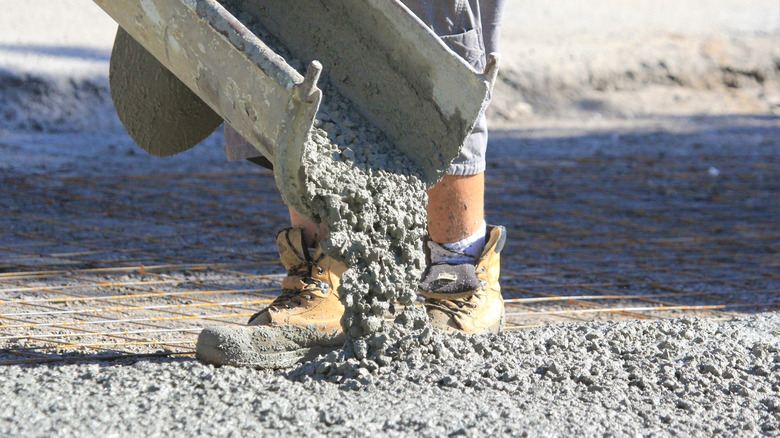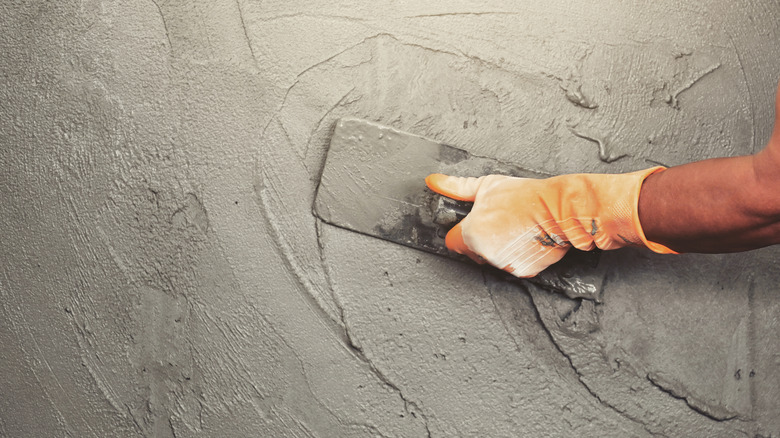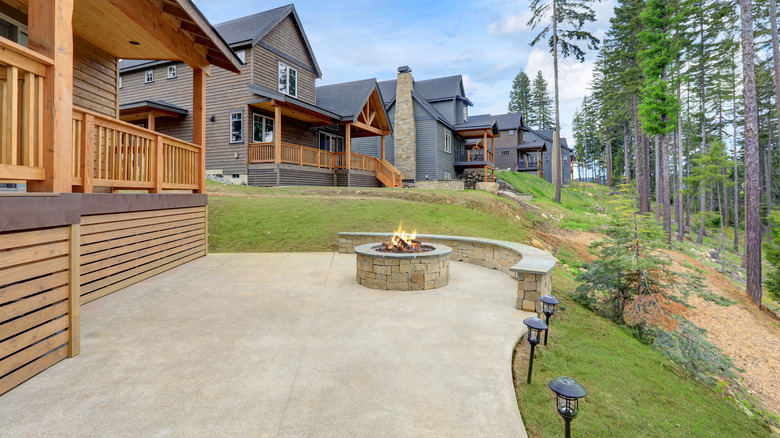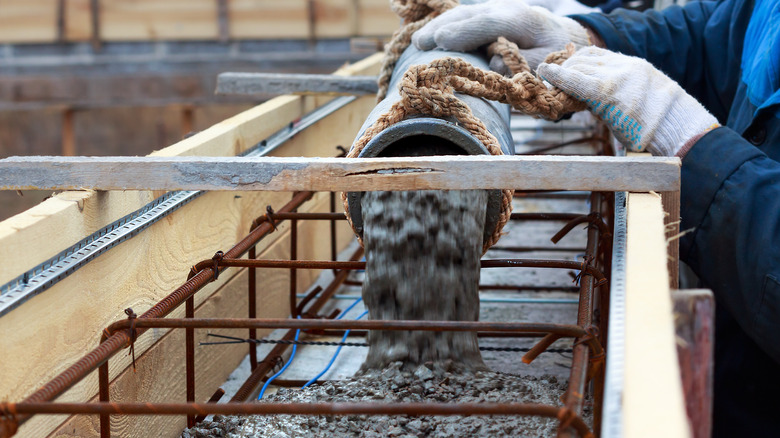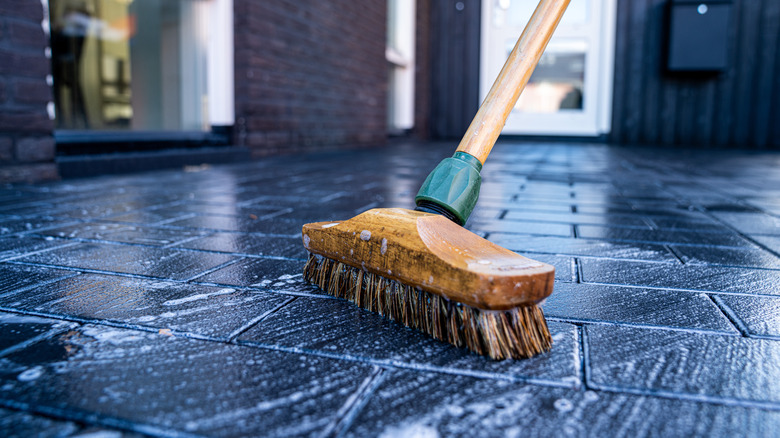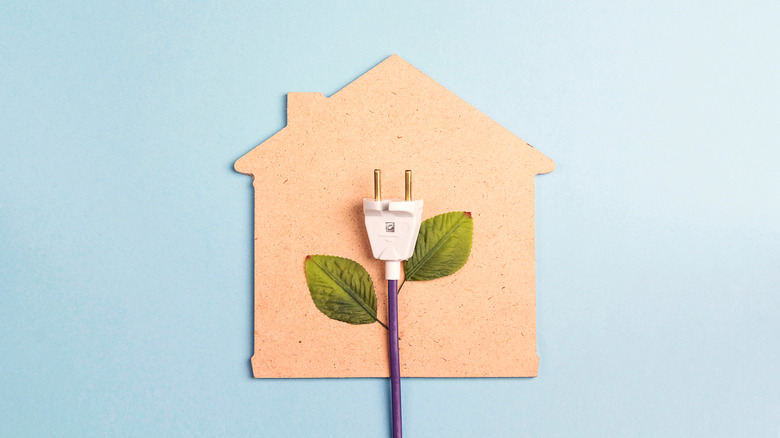How Much Does Concrete Cost Per Yard?
Whether you're looking for a quick and simple way to fill in an unfinished floor, create a multifunctional outdoor space in your backyard, or add a solid foundation to the area where you place trash cans or an outdoor air-conditioning unit, a concrete slab may be worth the consideration.
Lawn Starter states that the installation of a concrete slab usually costs between $4.34 and $7.73 per square foot. When transferred into square yards, the price increases to between $13.02 and $23.19. When it comes to different kinds of concrete, there is something different for each instance you choose to use it. When you identify the kind you need, however, you must then also choose which type of mixing process you wish to conduct (per Dynamic Concrete Pumping). Cemex mentions that more people prefer the standard ready-mix concrete, which is guaranteed quality because it is mixed at the manufacturing site before being transferred to your location, but at-site mixing concretes are also available for convenience.
If you think concrete is the right fit for you and your home, follow House Digest in breaking down the complete cost of installing concrete and examining all the material has to offer.
Factors for cost
Although installing concrete is a quick and simple task, there are still many elements that factor into the total price of installation. Some of these elements include prior preparations, materials, and labor. Let's take a closer look at them below.
Prior preparations
Before filling in the area of your choosing with concrete, the land must first be properly prepared. To prepare your land for concrete, you must first ensure that the area is completely level. This means that the area is flat with no hills or bumps. After the area is properly leveled, it must also be cleared of vegetation or any types of structures that can get in the way of the concrete filling. The easiest way to get these two preparations done is by grading the land. If you have the supplies to grade your own land, it can easily be done by yourself. If you don't, however, a professional may need to be hired to complete the task for you.
Size and materials
As mentioned before, according to Lawn Starter, an average slab of concrete can be purchased at the average price of $6.19 per square foot, which translates to $18.57 per square yard. The thickness and grade of concrete you decide to purchase, however, can significantly change the price of the concrete and the total of the entire project. An average $6.19 per square foot price accompanies an average 6-inch slab of concrete. Decreasing the thickness of the concrete by 1 inch will also decrease the price to a total of $5.78 per square foot. Similar to the thickness of the concrete, the lower grade of concrete you decide to purchase, the lower the price of the material will be.
Along with the concrete itself, Lawn Starter states that reinforcements and a decorative finish are also important to include when it comes to materials. Reinforcements are usually made from mesh or rebar, which makes the concrete stronger by helping it distribute any weight that is placed on top of it. To add reinforcements to your slabs of concrete, expect the price of your concrete slabs to rise to a price between $9.29 and $10.04 per square foot, which translates to between $27.87 and $30.12 per square yard. To finish off your concrete slab, you can also choose to pay extra for a decorative finish instead of leaving the slab with its original dull, grey appearance. For a decorative finish, you have the option of adding polish, staining, using an epoxy sealer or stamping a decorative design onto your concrete. These finishes are not necessary or important for the functionality of your concrete. They simply make it look good for an extra $3 to $30.
Labor
When it comes to installing concrete by yourself, The Washington Post warns to not underestimate how hard using concrete can be. It seems like a very simple material to work with, but many things can go wrong if you do not understand how it works. Even worse, if something does go wrong, you waste the rather expensive material and might even need to hire professionals to remove the concrete, as well, which will cost you even more than it would have to hire a professional to install the concrete in the first place.
For these reasons, it is highly recommended to hire a professional to complete your concrete task for you if you don't have a good understanding of the process yourself. Luckily, Lawn Starter already includes the cost of labor into the price of the concrete. This means that for an average cost of $6.60 per square foot, or $19.80 per square yard, you get a slab of concrete along with the professional installation process.
Additional costs
After your concrete slab has been installed, you may be inclined to make some additional purchases to put your concrete to good use. Especially when placed in your yard as a multifunction surface, you can invest in landscaping, an outdoor kitchen, or even a fire pit to enhance the entire area.
Landscaping
Once you have a concrete slab installed in your yard, you may feel inclined to make the area stand out more with new or different landscaping. Lawn Starter suggests that for landscaping around your concrete slab, you can plant a tree nearby to provide the area with shade or add bushes and flowers to bring some color to the area. Depending on the extent of landscaping you wish to apply to your yard, Forbes Advisor warns to expect to pay between $4 and $12 per square foot, which is equivalent to between $12 and $36 per square yard.
Outdoor kitchen
An outdoor kitchen can be another great addition to your yard after installing an outdoor concrete slab. Not only can the slab act as the perfect foundation for your outdoor kitchen appliances, but it can also hold an outdoor dining set to enjoy the meals you prepare and cook outside. Understandably, a full outdoor kitchen can be a major investment, but luckily, you can adjust your outdoor kitchen to fit both your personal needs and your budget. For example, if you wish to just add a grill with a small prepping area to your outside living space, Landscaping Network states that you can expect to pay between $200 and $4,000, which is significantly cheaper compared to a full outdoor kitchen set-up.
Firepit
An outdoor concrete slab can also be a great place to add a firepit, making the perfect place to relax on a cool summer night or even spend quality time with family. Home Advisor mentions that firepits do not have to be elaborate or expensive; therefore, there are a variety to choose from that can best fit your desires and budget. A very simple firepit, for example, shouldn't cost more than $300. A more elaborate one, on the other hand, can cost up to $1,400.
Types of concrete
As mentioned before, when you choose to install concrete in or around your home, you have two options. The first option is to have your concrete mixed at the sight of the construction. Dynamic Concrete Pumping states that this is when ingredients for the concrete are brought to the construction site and mixed directly onto the area you choose for your concrete slab. The more popular option, however, is the machine-mixed concrete which is mixed at the manufacturing location and then brought to the construction site with a good, guaranteed quality. Regardless of which concrete method you use, there are a variety of different mixtures you can choose from to best fit your specific use of the concrete. Let's take a look at some of these different kinds below.
Normal strength
Normal strength concrete is a very basic type of concrete that is commonly used for pavement in your driveway or buildings that don't need to withstand a lot of pressure. It is made from a mixture that includes concrete, sand, and aggregate and only takes between 30 and 90 minutes to set after installation.
Plain
Plain concrete is very similar to normal strength concrete because it is made from the same ingredients and can also be used for creating pavement and buildings that don't need to withstand vibrations from things like high winds. This specific type of concrete, however, is more commonly used for constructing water structures, like dams.
Lightweight
Unlike most types of concretes, which happen to be very dense, lightweight concrete is made less dense by using lightweight aggregates. This makes the concrete both lighter in weight but also have less thermal conductivity. This type of concrete is most commonly used for average building blocks and long bridge decks.
Prestressed
Prestressed concrete is a type of concrete that uses bars or tendons to support it. But before these supporting elements are put to use, they are stressed before applying the concrete. This system makes this type of concrete great for big projects that use a lot of concrete.
Precast
Precast concrete is a type of concrete that is made in a factory with exact specifications before it is shipped out to its construction site. This type of concrete is most commonly used for pre-made items, like concrete blocks, walls, poles, and stairs.
High-density
Completely opposite to lightweight concrete, high-density concrete is designed to have much more density than even an average slab of concrete. They are specifically used when constructing atomic power plants because of their ability to conceal and resist radiation that may come from it.
Maintaining your concrete
Although you may think that concrete can simply withstand anything, it, like every other man-made structure, also needs to be properly maintained in order for it to look good and last an extended period of time. Luckily, maintaining concrete is not a difficult task. In fact, with five easy tips, Ozinga states that you can extend the lifespan of your concrete and keep up its slick, new look.
Clean regularly
To make anything look good, you must clean it regularly. The same goes for concrete. Clearing away dirt and debris to expose the original surface underneath regularly will help keep your concrete looking good. The easiest way this can be done is by sweeping with an average broom and dustpan. For an even deeper clean, however, Wolf Paving also suggests using a pressure washer with average household cleaner, like bleach or baking soda and vinegar.
Properly seal the surface
Sealing your concrete's surface is also a great way to keep your concrete looking brand new and even extend its lifespan by properly protecting its surface from stains and other types of damage. Ozigna mentions that there are a variety of sealers you can choose from to best fit your specific type of concrete. Depending on the type of sealer you decide to use, plan to reapply it onto the concrete surface every few years or according to the manufacturing label.
Punctually remove stains
Even if you decide to seal your concrete, the surface still poses a risk of staining. To avoid staining at all costs, ensure you clean spills and stains properly as they appear. Ozinga specifically gives the example of a car parked on your concrete driveway or in your concrete floor garage. If the car happens to leak oil, it can pose a very strong risk of leaving a stain behind on the concrete whether it is sealed or not; therefore, the spill should be cleaned as soon as it is noticed. Although sealing your concrete makes removing stains on your concrete easier, it is even easier to clean up a mess before it becomes a stain.
Limit weight
Concrete is known for being a very heavy-weight material, but not all concretes are the same. Depending on your grade and thickness, your concrete can have a different level of strength that needs to be considered. Ozinga suggests that a big part of maintaining your concrete is limiting the amount of weight it holds at a time. Ozinga uses the example of a concrete driveway, stating that if your driveway was built only to hold an average car, replacing it with a heavy construction vehicle could cause the concrete to crack and break. To save your concrete from damage, it is recommended to place heavy objects or vehicles elsewhere, like in another area of your yard or on the side of the street.
Carefully use chemicals
Especially when you have gone through the process of sealing your concrete, you must be careful when using chemicals to clean it. Ozinga states that when not careful, chemicals can strip off your concrete's seal and even damage the concrete below. To avoid unwanted harm caused by the chemicals located in household cleaners, specific concrete cleaners are also available to be purchased. Also, when using chemicals in your yard, like fertilizer or weed killer, ensure you properly clean them from your concrete area after use to avoid further damage from the chemicals.
Benefits of using concrete
Considering the many materials you can choose to install inside or around your home, you may be wondering why concrete is the best option for you. HGTV shares several benefits of using concrete for your home project and how it could be the perfect material for you and your home.
Strong qualities
It is no mystery that concrete is a very strong material. TriStar Concrete even states that an average 4-inch slab of concrete can support approximately 8,000 pounds. On top of their ability to support heavyweight, they are also highly resistant to strong winds and heavy debris that could be caught in that wind. In fact, the most common household material for homes that are located in hurricane or tornado zones is concrete.
Durable material
Along with concrete's strong qualities, it is also known for being conveniently durable. While wood and other types of household materials can easily be penetrated by bugs or accumulate rot and begin to smell, concrete is resistant to all of it. Its surface is too strong to be penetrated by insects, and it doesn't accumulate any household moisture that could cause rot or unpleasant smells.
Energy efficient
Especially with energy prices on the rise, the installation of concrete is also a great way to save on energy. Because concrete is a tightly sealed material, it keeps energy used for air-conditioning and heating inside the home while also keeping harsh outside temperatures outside. This helps you both save energy by using it efficiently and better control the temperature of your home.
Helps cancel noise
Along with keeping harsh weather outside of your home, concrete's tight seal can also effectively cancel noise from your surrounding environment. So, if your neighbors are having a loud party next door, your concrete will absorb the noise so you can relax peacefully.
Resistant to fire
Another great thing about concrete is that it is completely resistant to fire. This means that if something in or around your home catches on fire, your concrete will not catch fire, nor will it spread to another area inside or around your home.
Healthy and good for the environment
As mentioned before, concrete is a sealed material, which means it can keep energy from leaking out of your house. Not only does this save you energy and money, but it also has a positive effect on the environment. Using concrete instead of other materials, like wood, which comes from trees, also has a positive effect on the environment.
Making your home environment healthy for you, concrete also doesn't pile up with allergens or mold that need household chemicals to remove and clean, which makes healthier air for you to breathe when you're at home.
